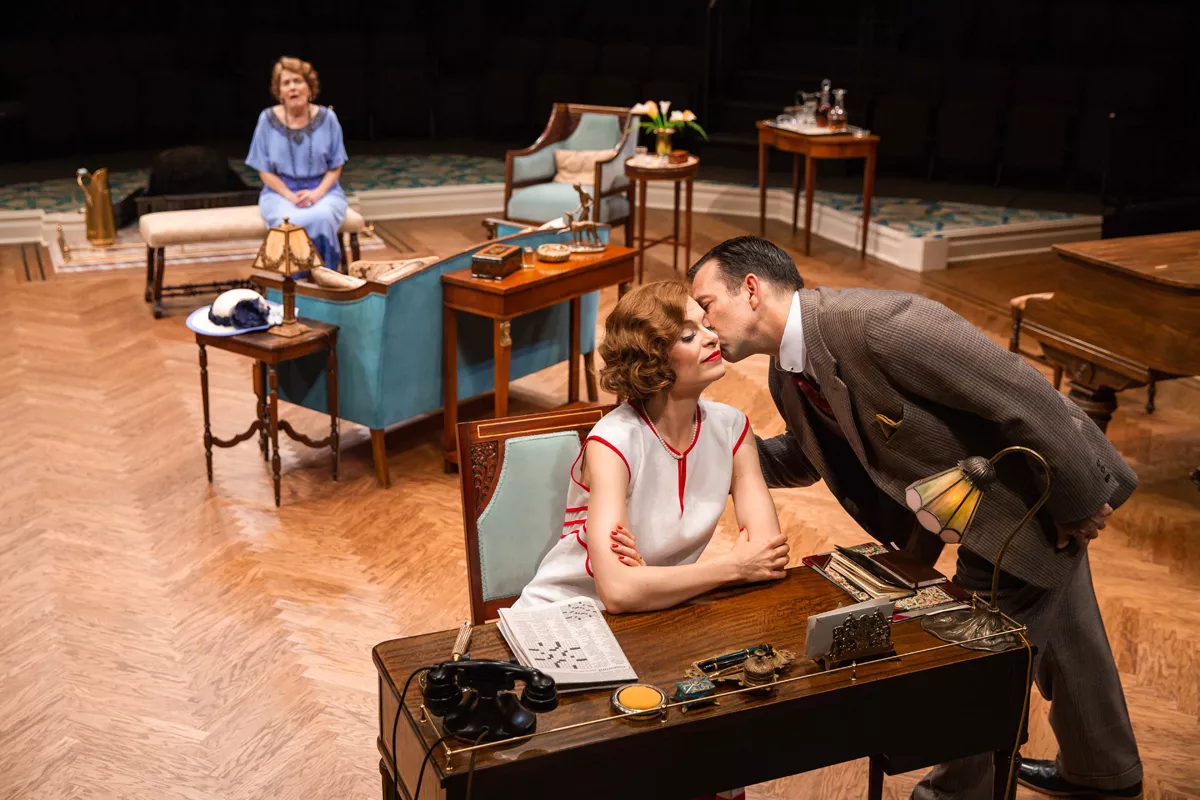Denver Center production of ‘The Constant Wife’ explodes sexism’s hypocrisy
It’s the late 1920s in England, and the kind of people who have butlers and cigarette cases are keen to gossip about the latest. Did everyone know that John is having an affair with Maria-Louise?
Of course, everyone did! That is, except for John’s wife, poor Constance Middleton, who enters the room at the top of the show wondering what everyone’s whispering about.
In this setup, the comedic plot would typically advance through a series of scenes based around John hiding his affair from Constance. Or the truth could come out and most of the comedy would focus on the anger — and possibly revenge — on the part of the deceived.
In W. Somerset Maughaum’s “The Constant Wife,” none of that happens. His play is a cleverly crafted platform for a strong, smart woman with an acerbic wit to work in, around and behind the sex and class system of the time to get exactly what she wants — and damn the men and the consequences.
Directed by Shelley Butler, “The Constant Wife” is staged in the Denver Center’s Space Theater, and the in-the-round configuration gives the actors plenty of freedom to move around in the Middeltons’ Harley Street home. More importantly, the intimate theater gives audience a better look at the facial tells of the actors — a crucial element given the many important “lines” that don’t rely on words.
Chief among these silent communicators is Constance herself, played with a wicked blend of benevolence and barbs by Gretchen Egolf. In Egolf, Butler found the perfect Constance: a sweet, pretty woman capable of delivering Maughaum’s most stinging lines with perfect timing and matter-of-factness. To use a chess analogy, Constance is very much the queen with the ability to move about as she likes, even as she generally allows the king to at least think he’s in command.
As John Middleton, Robert Mammana is a joy to watch. Often compelled to react to Constance’s latest outrageous statement with stunned silence, his jaw moving and his eyes wild, Mammana proves the perfect foil to Egolf’s Constance. Despite his incredulity at the machinations of his wife, and the aloofness typical of this breed of man in those times, Mammana believably conveys the underlying love John has for Constance.
Many an older play like this can sit on the shelf for years before the timing is right to re-stage it. Today’s #MeToo climate seems like the perfect time to bring out “The Constant Wife” to remind us, once again, that men don’t rule the world (even if they think they do) and that any woman with a notion to assert a more powerful position can do so if she just stands up.
Even the most fervent activist might blanch at the level of male disparagement in “The Constant Wife.” None are so damning of the Y chromosome than Mrs. Culver (a marvelous Carol Schultz, who appears to be enjoying herself immensely in the role.) The mother of Constance and Martha (Julia Knitel), Mrs. Culver’s regards men as a lot of deeply stupid annoyances whose only redeeming value is generating income. An equal-opportunity insult-comic, she at one point turns to Martha and says: “I always thought you were rather stupid.”
As both mistress to John and best friend to Constance, Marissa McGowan as Maria-Louise Durham is an inspired choice. Last seen at DCPA as the hilarious right-wing baby machine in “Human Error,” McGowan is a force of nature who plays Maria-Louise as a busty blonde product of her times, more or less content to draw within the lines of high society. But she can still dish out the put-downs and manages to turn a few tables on her own.
The final point on this love rectangle is Bernard Kersal (Estes Tarver), the rather dull but good-looking former lover of Constance who’s back from China for another attempt at her heart.
Rounding out the cast are Wayne Kennedy as the butler Bentley, Miriam A. Laube as Constance’s entrepreneurial friend Barbara Fawcett and Rodney Lizcano as the cuckolded husband to Maria-Louise, Mortimer Durham.
As the lights go down on “The Constant Wife,” we’re left in awe of how Constance has put together a cats-cradle of things set in motion not only aimed at arriving at her preferred destination, but John’s as well (even if he’s not quite sure this was his stop). The second act moves briskly as all the pieces fall into place — and not at all where we imagined they might’ve landed.
Perhaps better known for his later novels such as “The Razor’s Edge,” Maugham began his careers as a playwright, and his script for this play is a fine bit of writing with plenty of laughs. It’s brought to life beautifully by Butler and this strong cast, while Sara Ryung Clement’s costume designs and the set by Takeshi Kata place us firmly in the period.
“The Constant Wife” runs through Oct. 21.
Alex Miller is editor and publisher of OnStage Colorado. He has a long background in journalism, including stints as the top editor at the Vail Daily, Summit Daily News, Summit County Journal, Vail Trail and others. He’s also been an actor, director, playwright, artistic director and theatre board member and has been covering theatre in Colorado since 1995.



Leave A Comment